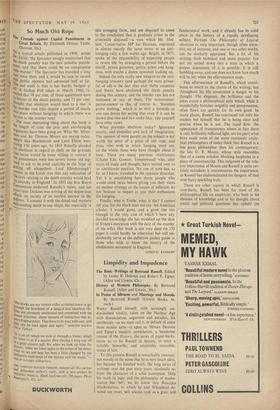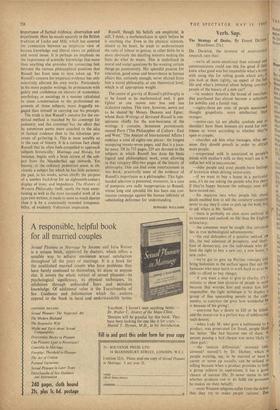Limpidity and Impudence
The Basic Writings of Bertrand Russell. Edited by Lester E. Denonn and Robert E. Egner. (Allen and Unwin, 42s.)
WHILE Russell himself, with seemingly un- diminished vitality, takes on the Nuclear Age with denunciation, argument and paradox, his apotheosis—as we must call it, in default of some more secular term—is upon us. Messrs. Denonn and Egner's massive compilation, a handsome reissue of the History, the series of paper-backs, invite us to fix Russell in history, to erect a suitably honorific, and unsuitably immobile, statue of him.
To this process Russell is remarkably resistant; not merely in the sense that he is very much alive, but because his finished work, the long series of writings over the past sixty years, resolutely re- fuses the character of a solid monument. Only his work in logic and the philosophy of mathe- matics has 'set'; we do know that Rrincipia Mathematica, to which he and Whitehead de- voted ten years, will always rank as a great and
fundamental work, and it already has its solid place in the history of a rapidly developing subject. Perhaps The Philosophy of Logical Atomism (a very important, though often tenta- tive, set of lectures), and one or two other works, can be similarly appraised. But a lot of his writing, both technical and more popular. has not yet settled down into a state in which a proper assessment of it is possible. It is still bubbling away, and one does not know how much will be left when the effervescence stops.
This effervescence of Russell's, which contri- butes so much to the charm of his writing, has throughout his life constituted a danger to his thought. The elegance, the brilliance and the jokes create a philosophical style which, while it wonderfully banishes turgidity and pompousness, often flows too quickly for its own good. In many places, Russell has convinced not only his readers but himself that he is being clear and precise when he is not. The rapid flow, the appearance of transparency where in fact there is only brilliantly reflected light, are (in part) what have made some of the more cautiously analy- tical philosophers of today think that Russell is a less great philosopher than his contemporary, the late G. E. Moore, whose style resembles that of a canny solicitor blocking loopholes in a piece of conveyancing. This judgment of the rela- tive importance of Moore and Russell is quite cer- tainly mistaken; it overestimates the importance, as Russell has underestimated the dangers, of that over-hasty sparkling style.
There are other aspects in which Russell is over-hasty. Russell has been for most of his philosophical life an empiricist, who both in his theories of knowledge and in his thought about social and political questions has upheld the
importance of factual evidence, observation and experiment. Here he stands squarely in the British tradition of Locke and Mill, which has asserted the connection between an empiricist view of human knowledge and liberal views on political and moral issues. It is perhaps an emphasis on the importance of scientific knowledge that more than anything else provides the connecting link between the various philosophical positions that Russell has from time to time taken up. Yet Russell's concern for empirical evidence has only selectively affected his own works Particularly in his more popular writings, he pronounces with gaiety and confidence on matters of economics, psychology or sociology in a manner calculated to cause consternation to the professional• ex- ponents of those subjects, more doggedly en- gaged than himself in carrying out his precepts.
The truth is that Russell's concern for the em- pirical method is matched by his contempt for pedantry; and this contempt •has the effect that he sometimes seems more attached to the idea of factual evidence than to the laborious pro- cesses of gathering it. This is most notably so in the case of history. It is a curious fact about Russell that he often feels compelled to approach subjects historically: Marriage and Morals, for instance, begins with a brisk review of the sub- ject from the Neanderthal age onwards. Yet history, in the ordinary pedestrian sense, is ob- viously a subject for which he has little patience; the past, in his works, serves chiefly the purpose of a sombre backdrop for an eighteenth-century display of irony and impudence. The History of Western Philosophy itself, surely the most enter- taining as well as the most successful work of its type ever written, is made to seem so much shorter than it is by a consciously revealed irresponsi- bility, of evidently Voltairean inspiration. Russell, though his beliefs are empiricist, is still, I think, a mathematician in spirit before he is anything else. Even in the physical sciences, closest to his heart, he tends to underestimate the ratio of labour to genius; in other fields he is more obviously the dazzling maestro making the facts do what he wants. This is underlined in moral and social questions by his wanting certain things so passionately. His splendid passion for toleration, good sense and benevolence in human affairs has, curiously enough, never elicited from him a moral philosophy, at any theoretical level, which is of appropriate weight.
The centre of gravity of Russell's philosophy is to be found at its mathematical end; it gets lighter as one moves into less and less deductive realms. This view, however, seems not to be shared by Messrs. Denonn and Egner, whose Basic Writings of Bertrand Russell is con- spicuous chiefly for the non-basicness of the writings it contains. Seventeen portentously named Parts (`The Philosopher of Culture: East and West,' The Analyst of International Affairs) embrace a total of eighty-one pieces: the longest occupying twenty-seven pages, and that is a jocu- lar essay. Of its 733 pages, 229 are devoted to the subjects in which Russell has done his basic logical and philosophical work, even allowing in that category fifty-two pages of the history of philosophy. One can find some entertainment in this book; practically none of the evidence of Russell's importance as a philosopher. This light- headed selection is presented, moreover, in a tone of pompous awe sadly inappropriate to Russell, whose long and splendid life has been one con- tinuous campaign against the human infirmity of substituting deference for understanding.
BERNARD WILLIAMS







































 Previous page
Previous page